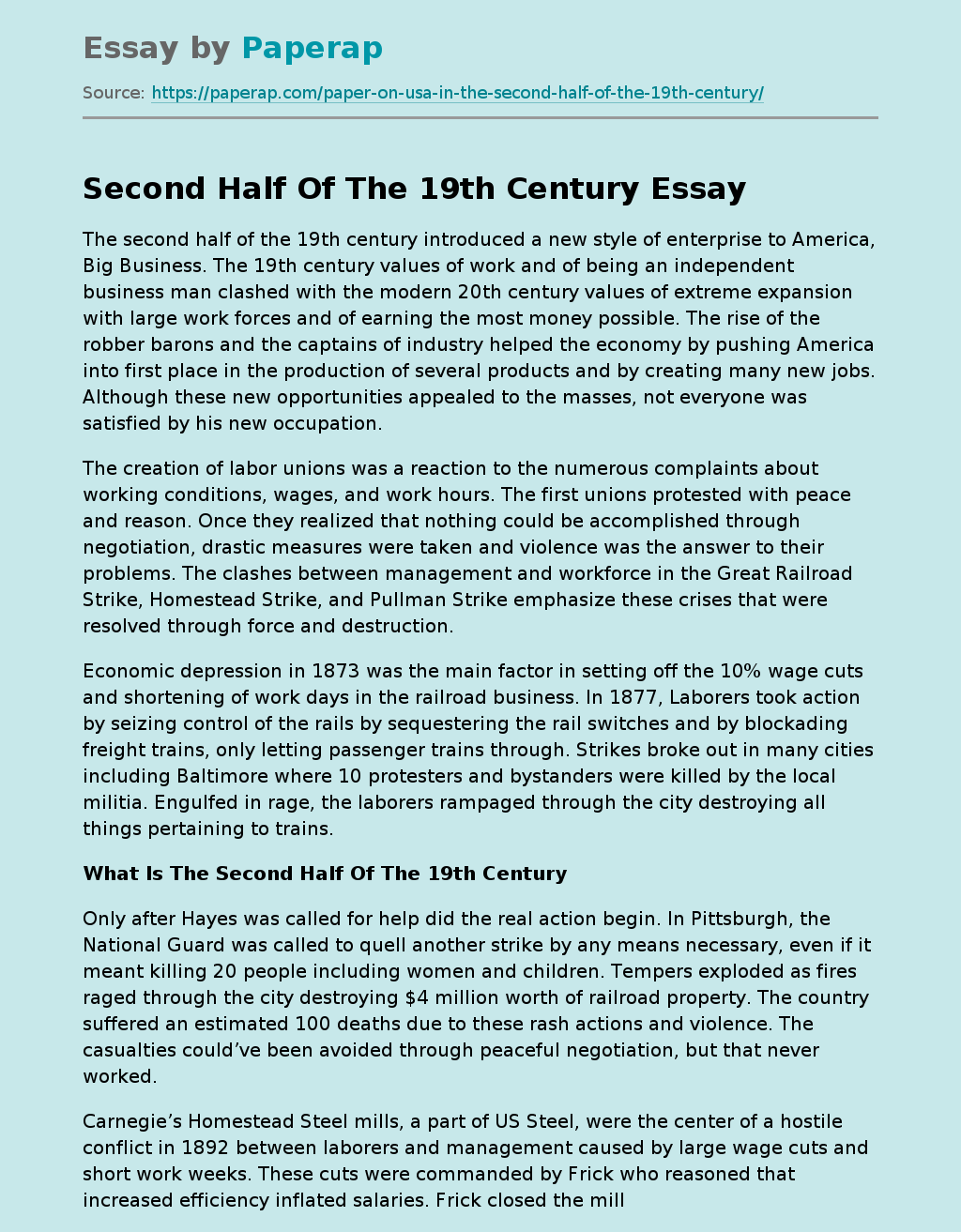Second Half Of The 19th Century
The following sample essay is about the second half of the 19th century. Read the introduction, body and conclusion of the essay, scroll down.
The second half of the 19th century introduced a new style of enterprise to America, Big Business. The 19th century values of work and of being an independent business man clashed with the modern 20th century values of extreme expansion with large work forces and of earning the most money possible. The rise of the robber barons and the captains of industry helped the economy by pushing America into first place in the production of several products and by creating many new jobs.
Although these new opportunities appealed to the masses, not everyone was satisfied by his new occupation.
The creation of labor unions was a reaction to the numerous complaints about working conditions, wages, and work hours. The first unions protested with peace and reason. Once they realized that nothing could be accomplished through negotiation, drastic measures were taken and violence was the answer to their problems.
The clashes between management and workforce in the Great Railroad Strike, Homestead Strike, and Pullman Strike emphasize these crises that were resolved through force and destruction.
Economic depression in 1873 was the main factor in setting off the 10% wage cuts and shortening of work days in the railroad business. In 1877, Laborers took action by seizing control of the rails by sequestering the rail switches and by blockading freight trains, only letting passenger trains through. Strikes broke out in many cities including Baltimore where 10 protesters and bystanders were killed by the local militia.
Engulfed in rage, the laborers rampaged through the city destroying all things pertaining to trains.
What Is The Second Half Of The 19th Century
Only after Hayes was called for help did the real action begin. In Pittsburgh, the National Guard was called to quell another strike by any means necessary, even if it meant killing 20 people including women and children. Tempers exploded as fires raged through the city destroying $4 million worth of railroad property. The country suffered an estimated 100 deaths due to these rash actions and violence. The casualties could’ve been avoided through peaceful negotiation, but that never worked.
Carnegie’s Homestead Steel mills, a part of US Steel, were the center of a hostile conflict in 1892 between laborers and management caused by large wage cuts and short work weeks. These cuts were commanded by Frick who reasoned that increased efficiency inflated salaries. Frick closed the mill and hired and placed 300 Pinkerton Detectives on guard duty. On July 6th, much blood was spilled as a gunfight between the guards and laborers ensued for 12 hours. The workers won the battle, but lost the war completely. ,500 National Guard members took control of the mill and the blame of an assassination attempt at Frick was blamed on the Labor Unions. In November, all steel unions were broken, and the mill operated on cheap labor from African Americans and immigrants. The hours were brutal as they were pushed to work 12 hours a day with a 24 hour day every 2 weeks. The Steel Industry didn’t see unions for another 44 years. The management had won. The government was an avid supporter of big business which is evident in the Pullman Strike of 1894.
Still feeling the effects of depression, the Pullman Palace Car Company had to lay off 5,800 workers and also cut wages from 25-50%. Even though they were making less money, the Pullman town didn’t lower the rent. On May 11th, 90% of the workers went on strike and a month later, ? million across the country joined them by refusing to pull Pullman sleeping cars. Lawyers, as tricky as they are, managed to get a court injunction to force the workers back to work by attaching a US mail car to a Pullman car and say the laborers were disturbing the distribution of mail.
The workers didn’t comply to with the courts jurisdiction and so 14,000 troops were sent by Grover Cleveland to enforce the ruling. 25 were killed as the troops shot into a crowd of 10,000 in Chicago. Hundred were jailed including Eugene Debs, leader of the American Railway Union who ordered the workers to stop pulling the Pullman cars. The government prioritized a strong healthy economy over a large and happy population. Rapid industrialization and nation-wide corporations led to wealthier families and a new middle class.
Although there were many who did enjoy the new luxuries paid for by new salaried jobs like managers, technicians, and engineers, many more people were below the poverty line and resided in the slums, living with other families with no privacy and unsanitary conditions. These families were unfortunate because of the wage cuts and the replacement of labor by immigrants and African Americans. A change was in order and the labor unions took the plate by voicing their complaints, and, when that didn’t work, resorting to physical means to get what they wanted.
Second Half Of The 19th Century. (2019, Dec 05). Retrieved from https://paperap.com/paper-on-usa-in-the-second-half-of-the-19th-century/

